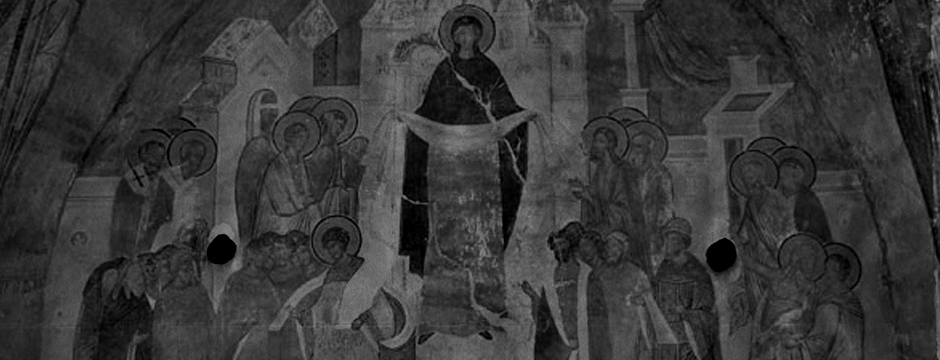“…This is the way we should see Christ. He is our friend, our brother; He is whatever is good and beautiful. He is everything. Yet, He is still a friend and He shouts it out, “You’re my friends, don’t you understand that? We’re brothers. I’m not…I don’t hold hell in my hands. I am not threatening you. I love you. I want you to enjoy life together with me.”
– +St. Porphyrios of Kavsokalyvia
“…we, if we wish to retain grace, must pray for our enemies. If you do not find pity on a sinner who will suffer in flames, then you do not carry the grace of the Holy Spirit, but rather an evil spirit…”
– +St. Silouan the Athonite
There is a notion going about lately – in some ways, it has been going around for some time – that there is a kind of triumphalist joy to be found in the idea of souls going to Hell, and not simply going there, but suffering there for eternity. Frankly, much of this theological attitude I find reprehensible at best. There is no joy, no righteous triumph in the damned suffering in hell, and the last thing on one’s mind should be (whether consciously or subconsciously) making a career out of announcing the damnation of others. The declaration that one is very likely a damned soul is not “the good news.”
Unfortunately, I see the same prevalent attitude in much of Christianity today that once drove me away from Christ altogether – a wave of imitators who seem to merely seek to ape and top the fire-and-brimstone preaching of the Puritan theologian Jonathan Edwards, in my opinion, completely miss the point of what the Gospel is, and instead only serve to drive away anyone seeking Christ and His Church.
Our God says “I take no pleasure in the death of the wicked,” (Ezekiel 33:11), and yet I continually find the opposite sentiment. Thomas Aquinas, once chief amongst Roman Catholic theologians for several centuries, said that “in order that the happiness of the saints may be more delightful to [the blessed in heaven] and that they may render more copious thanks to God for it, they are allowed to see perfectly the sufferings of the damned,”1 and further, they “do not pity the afflictions of the damned.”2 Consider the weight of Jonathan Edwards words to those who remain unrepentant: “If you cry to God to pity you, he will be so far from pitying you in your doleful case, or shewing you the least regard or favour, that instead of that, he’ll only tread you under foot: And tho’ he will know that you can’t bear the weight of omnipotence treading upon, yet he won’t regard that, but he will crush you under his feet without mercy; he’ll crush out your blood, and make it fly, and it shall be sprinkled on his garments, so as to stain all his raiment.”
Such violent, abhorrent concepts of God do not seem to me to fit who God is. In fact, to my mind, they speak to an incredibly human understanding of transcendent concepts, diluted and poisoned to become nothing more than sermons with which to terrorize rather than admonish. To be sure, admonishments towards a sinner can be indeed bleak and seemingly harsh, depending on the person and the peril; witness the words of St. Tikhon: “Above you is the sword of truth, under you is hell which is ready to devour you, in front of you is death, behind you is the great multitude of your sins, on your right hand and on your left are crowds of malicious enemies. Do you wish to stay in carelessness?” St. Tikhon’s words may seem frightening at first, but I believe are meant to sober the soul of the hearer, and redirect one’s feet back on to the straight and narrow.
And so, to the question of whether or not we should hope that all men be saved, I would ask the question, “Should we hope that any are damned?” I mean this quite seriously. To those who spout off bloodlust-laden polemics about how some will go to hell and that we know this for a certainty, relishing and nearly finding a sick sense of joy in the concept, I would ask this question. In fact, this seeming delight at the damnation of anyone speaks more to our human weakness than of any kind of righteous correctness in thought.
St. Silouan the Athonite, spent his life weeping and praying for the whole world, and especially for his enemies. Compare his words to those above, and think on them: “O how great is the mercy of God! I am such a vile, despicable person, yet the Lord so dearly loves me. But He is love itself; and loves all men thus, and in His mercy calls us to Him: ‘Come unto me, all ye that labour and are heavy laden and I will give you rest.'”4 St. Isaac the Syrian, one of the greatest lights of the entire Church, does not terrify the sinner into the embrace of God but rather encourages the sinner forward, despite their sinfulness: “Do not be slow to approach because you are afraid of your sins, O sinner, for it is by meditating upon this that the dust of sin will be shaken off your mind.”5 St. Anthony the Great says that “to say that God turns away from the wicked is like saying that the sun hides itself from the blind.”6
Yes, the Scriptures say there is a hell, and that the smoke of the torment of those in it will rise forever and ever (cf. Rev. 14:11), but I do not think God delights in the sufferings of those in hell. In fact, it says in the Psalms that “If I go down to hell, thou art there also” (Psalm 139:7). Christ wept at the sufferings of man and through His Incarnation, identified with us in the most intimate way. He does not terrify us into believing in Him, but beckons us into communion with Him.
Should we hope that all men are saved? Yes, just as God “wants all people to be saved and to come to a knowledge of the truth.” (1 Tim. 2:4). As for the judgment of those damned, let us leave it to Christ, who is the sole Judge.
1 – Summa Theologica, III.94.i
2- ibid., III.94.ii
3 – “Sinners in the Hands of an Angry God”
4 – St. Silouan the Athonite, XIX, 462
5 – qtd. in The Syriac Fathers on Prayer and the Spiritual Life, 352
6 – qtd. in Fr. Michael Pomazansky, Orthodox Dogmatic Theology, 351
7 – qtd. in St. Theophan the Recluse, Turning the Heart to God, 66


